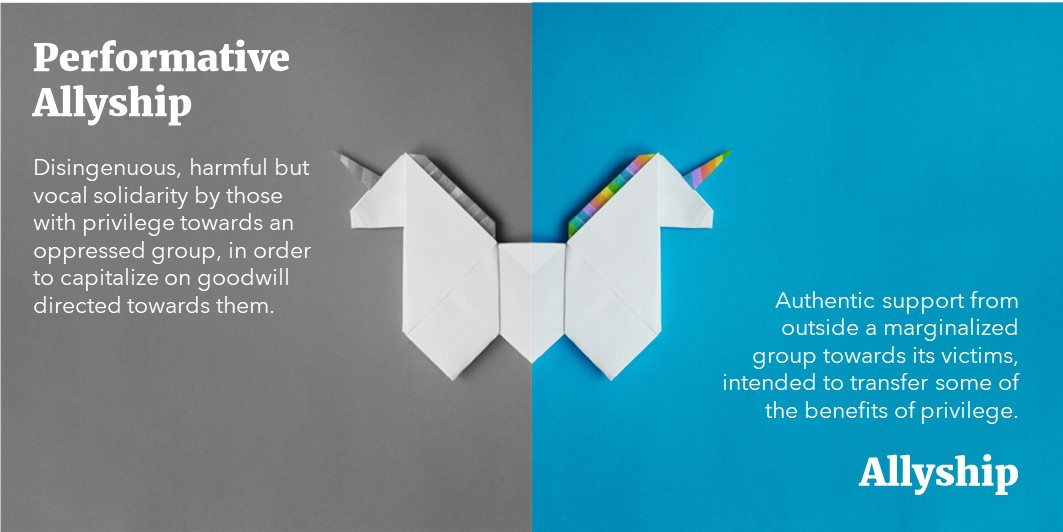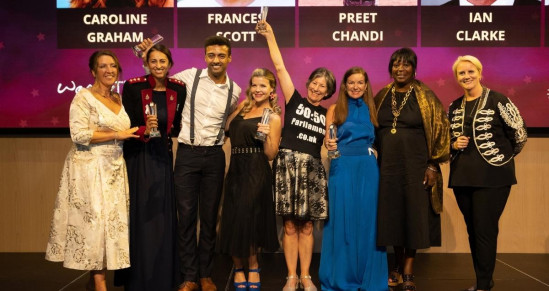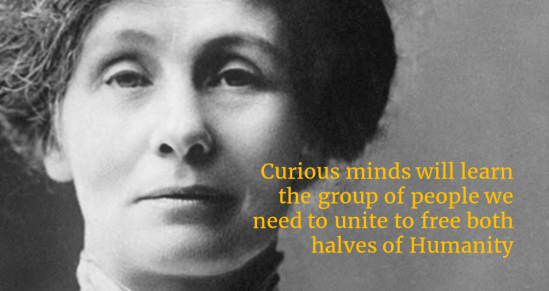By emphasising social justice, inclusion and the equality of human rights in all that you do, you can create the ultimate working environment for creative ideas, perspectives and opinions to thrive. That means taking a naturally and actively anti-oppressive stance on conversations and matters concerning all areas of diversity from age, race, gender, ability, nationality, religion, sexuality and more.
Legitimate versus Performative Allyship
During Pride 2017, my friends and I joined the throngs of revelers celebrating #loveislove by watching Pride Parade on London's Regent Street and cheering on the many courageous members of our LGBTQ+ community as they marched us by flanking their corporate floats. But as Barclays float approached, the whole mood amongst the crowd changed into boo's. "Why are we booing Barclays?" I asked a friend. "Because they're just 'rainbow-washing', they don't really care about us" was his matter-of-fact response. I remember thinking to myself "at least Barclays has sponsored Pride, at least Barclays dares to operate a branch in Soho (London's main LGBTQ+ district), at least Barclays is engaging with our community. My bank is nowhere to be seen". For me, Barclays were entering a space of advocacy where few banks had dared go before and that deserved support. Sadly, its those we don't see who deserve yet escape the boos most.
But we've come a long way in 5 years. Today, most banks are represented in Pride celebrations in some form or another. Perhaps that's because today, the £3tr value of the pink pound grows ever larger thanks to the growing influence and spending power of GenZ - a generation where 21% of people admit to some form of same-sex attraction. With such ubiquitous support, how can we determine whose allyship is legitimate and whose allyship is performative? The sad reality is that today, there isn't a single 'out' CFO, CEO or Chairperson across the UK's top-100 businesses. All too often, LGBTQ+ people are peaking below their potential in big business, and that is fueling a lack of representation, sponsorship and mentorship opportunities to lift up others within a community still blighted by poverty, drug addiction, poor mental health, high unemployment, intersectional hate crime and safeguarding issues.

The Do's and Don'ts of Corporate Allyship
Commissioning a float for pride parade, changing your corporate profile picture to a rainbow or sponsoring a charity that provides university scholarships to black college students all require time and monetary commitment, but are they truly effective in implementing substantial change for the future? We should be educating softer skills and whilst all of these actions are great at creating visibility, businesses have to start ‘walking the walk’. That means establishing funded, sponsored and effective LGBTQ+ staff networks and talent accelerators. It means appointing or hiring in LGBTQ+ spokespeople who can contextualise the importance, history and meaning of events like Pride to colleagues. And it means being able to capably and fluently articulate the commercial value that LGBTQ+ people bring to business. Only then will you realise the financial and people benefits that come with your expense, beyond the external customer goodwill many are solely targeting today.
And then comes the challenge of measuring effectiveness. It’s likely you’ve got very sophisticated systems and even vendors in place to measure the effectiveness of your sales campaigns or product lines. But do you similarly measure the effectiveness of your efforts to boost inclusion? Do you even collect enough data to allow you to do so?
Such as:
Staff retention
Staff satisfaction / sentiment
Customer feedback
Staff diversity
Intangible goals (e.g. ideas generation)
Ultimately you measure what you treasure.
Billboards do not create meaningful change. People do
An increasingly popular way of managing these many duties is to appoint a Head of Diversity & Inclusion. But beware of the many pitfalls here:
Many firms ask for HR professionals, but this isn’t exclusively an HR matter – it touches every aspect of a business.
Many firms ask for over 15 years experience, which is tantamount to age discrimination in itself. Empathy has no experiential requirement, indeed long term tolerance of discriminating systems may be an inhibitor to success.
DEI Heads may often become scapegoats for a firm's DE&I success or failure. In reality, we are all the Head of D&I at our firms and we carry equal responsibility for being inclusive of minorities and exclusive of hatred.
Remember that those from oppressed backgrounds can see through performative measures since anything ineffective will not help improve their lived experience of working at your firm. Beware of this trap, for it can often cause more harm than good.
Become the change you want to see today. We are here to help, will you join us?
Deilight can help you gather and analyse data, and formulate meaningful engagement strategies around key DE&I events such as Pride Month. Plus the intersectional LGBTQ+ members of our consultancy team can help articulate the significance and champion the progressiveness of your decision to invest meaningfully in our community to the people who need to hear it most - your people. Get in touch today to discuss how we can help you thrive financially through difference.
.png)



